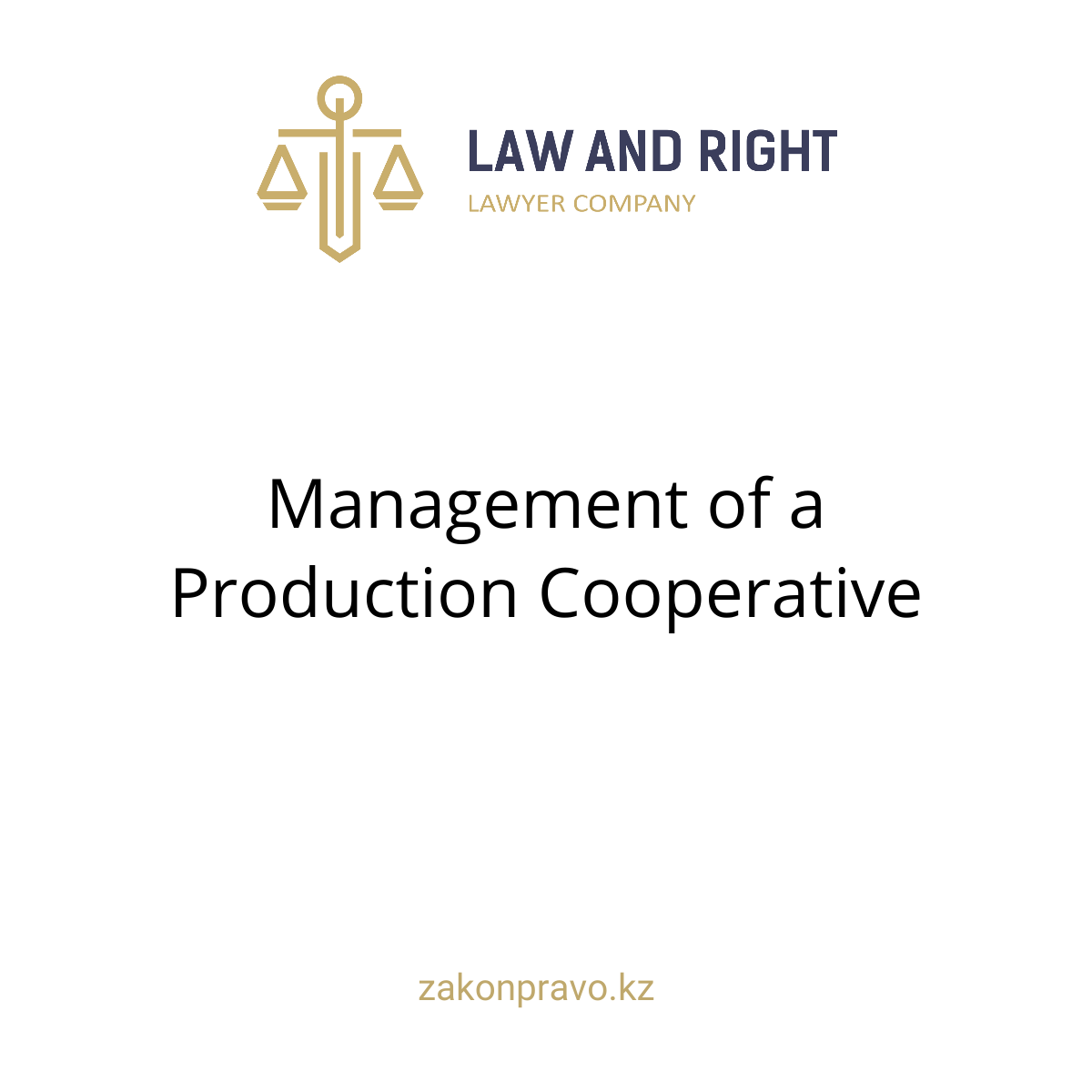Management of a Production Cooperative
I. General Characteristics of Management in a Production Cooperative (PC)
Management in a PC is a democratically organized system where all members have equal rights in making fundamental decisions, regardless of the size of their share contribution or labor participation. Article 99 of the Civil Code of the Republic of Kazakhstan (CC RK) establishes a three-tier management structure:
- General meeting of cooperative members (supreme governing body);
- Executive body (board or chairman);
- Supervisory board (control body), if established.
II. Detailed Analysis of the Article’s Provisions
Clause 1. Organizational Structure
- General meeting of members — the supreme governing body. All members have equal voting rights (clause 4 of Article 99), regardless of share size, which distinguishes a cooperative from LLPs and JSCs.
- Supervisory board — established at the members’ discretion:
- Exercises control over the executive body;
- Does not perform representative functions;
- Conflict of interest prevention: membership in both the executive and supervisory boards is prohibited.
- Executive body:
- May be collegial (board) or sole (chairman);
- Performs day-to-day management;
- Accountable to the general meeting and, if applicable, to the supervisory board.
Clause 2. Regulation of Powers
The competencies of the governing bodies and decision-making mechanisms must be clearly defined in the charter; otherwise, legal risks arise, especially in disputes between members. Relevant regulations include:
- Article 97 of the CC RK — on charter content;
- The Law of the Republic of Kazakhstan “On Production Cooperatives” — detailed procedures on convening meetings, voting, authority, and reporting.
Clause 3. Exclusive Competence of the General Meeting
This includes:
- Amendments to the charter — including income distribution, property rights, labor obligations;
- Formation/removal of management and control bodies;
- Admission and exclusion of members — a key mechanism for protecting the cooperative from passive or conflicting participants;
- Approval of reports and income distribution — links cooperative structure to personal labor contribution;
- Decisions on reorganization and liquidation — require a quorum and qualified majority (as defined in the charter).
🔹 The charter may expand this list, but transferring such powers to the executive body is prohibited.
Clause 3-1. Special Governance During Bankruptcy
In case of rehabilitation or bankruptcy procedures, powers are transferred to:
- Temporary administrator (during rehabilitation);
- Bankruptcy trustee (during liquidation).
📎 Legal basis: Law of the Republic of Kazakhstan “On Rehabilitation and Bankruptcy” and clause 3-1 of the article.
Clause 4. The "One Member — One Vote" Principle
- A fundamental cooperative rule reflecting equality of members, regardless of financial contributions.
- Another voting arrangement is allowed only for multi-profile cooperatives with category-based participation, if permitted by special law.
III. Comparative Analysis with Other Legal Forms
| Element | Production Cooperative | LLP (TОО) | JSC (AO) |
|---|---|---|---|
| Supreme governing body | General meeting of members | General meeting of partners | General meeting of shareholders |
| Voting principle | One person — one vote | Proportional to share | Proportional to shares |
| Mandatory labor participation | Yes | No | No |
| Supervisory body | Optional | Optional audit commission | Mandatory board of directors |
IV. Judicial Practice and Risks
🔹 Frequent disputes involve:
- Dismissal of board members without grounds not stipulated in the charter;
- Profit distribution not matching labor contribution, due to lack of clear criteria;
- Exclusion of members without following due procedures (e.g., warnings, opportunity to respond).
📎 The Supreme Court of the Republic of Kazakhstan emphasizes: “The cooperative charter must contain internal control mechanisms and conflict resolution procedures; otherwise, general provisions of the CC RK and the Law on Production Cooperatives apply.”
V. International Standards (Comparison)
📘 The International Co-operative Alliance (ICA) recognizes the principles of:
- “One person — one vote”;
- Priority of labor participation and democratic governance;
- Limited powers of executive bodies.
📌 These standards are integrated into Kazakhstan’s legislation through norms on subsidiary liability, participation in governance, and labor-based income distribution.
VI. Conclusions
- Article 99 of the CC RK enshrines a democratic management model where decisions are made collectively and management bodies are formed from the members themselves.
- Equal voting, mandatory personal participation, and direct oversight are key features.
- The charter plays a crucial role in preventing internal conflicts and must include detailed rules on governance, powers, and responsibilities.
- In the absence of a supervisory board, there is a higher risk of unchecked executive authority.
Attention!
Law and Law Law Law draws your attention to the fact that this document is basic and does not always meet the requirements of a particular situation. Our lawyers are ready to assist you in legal advice, drawing up any legal document suitable for your situation.
For more information, please contact a Lawyer / Attorney by phone: +7 (708) 971-78-58; +7 (700) 978 5755, +7 (700) 978 5085.
Attorney at Law Almaty Lawyer Legal Services Legal Advice Civil Criminal Administrative Cases Disputes Protection Arbitration Law Firm Kazakhstan Law Office Court Cases


